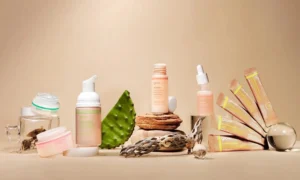As global awareness of environmental challenges grows, the need for sustainable solutions across industries becomes increasingly urgent. The beauty and skincare sectors, in particular, have come under scrutiny for their impact on the planet. Sunscreen, an essential product for skin health, is no exception. Many traditional sunscreens contain harmful chemicals and packaging that negatively affect marine life and ecosystems. In response, Zicail has emerged as a leader in the development of eco-friendly and sustainable sunscreen production.
This article explores Zicail’s commitment to sustainability, highlighting its innovative practices, eco-conscious formulations, and dedication to preserving the environment while delivering high-quality products.
Understanding the Environmental Impact of Sunscreens
Sunscreens are vital for protecting the skin against harmful ultraviolet (UV) radiation, but their widespread use has unintended consequences for the environment. Key issues include:
- Chemical Pollution: Ingredients like oxybenzone and octinoxate, commonly found in conventional sunscreens, have been linked to coral bleaching. These chemicals harm marine ecosystems, particularly in tropical areas.
- Plastic Waste: Single-use plastic packaging from sunscreen products contributes to the growing global plastic pollution problem, affecting landfills and oceans.
- Carbon Footprint: Traditional manufacturing processes often rely on non-renewable energy sources, contributing to greenhouse gas emissions.
Zicail recognizes these challenges and has made it its mission to address them through innovative solutions and sustainable practices.
Eco-Friendly Formulations: Protecting Skin and the Planet
One of Zicail’s core strategies for sustainability is the development of eco-friendly Sunscreen Manufacturer.Their commitment to creating products that protect both skin and the environment includes several key principles:
1. Reef-Safe Ingredients
Zicail’s sunscreens are free from harmful chemicals like oxybenzone and octinoxate, ensuring they are safe for marine ecosystems. Instead, they utilize mineral-based UV filters such as zinc oxide and titanium dioxide, which provide broad-spectrum protection without harming coral reefs.
2. Biodegradable Ingredients
To minimize environmental impact, Zicail incorporates biodegradable components in its formulations. These ingredients break down naturally and do not persist in ecosystems, reducing their footprint on the planet.
3. Multifunctional Additives
Zicail enhances its sunscreens with natural antioxidants, hydrating agents, and skin-soothing botanicals. These multifunctional ingredients not only provide superior skincare benefits but also reduce the need for additional products, aligning with minimalist and sustainable lifestyles.
Sustainable Manufacturing Practices
Beyond the formulation of its products, Zicail is committed to reducing the environmental impact of its manufacturing processes. This includes:
1. Energy Efficiency
Zicail’s production facilities are equipped with energy-efficient technologies, reducing their reliance on fossil fuels. By incorporating renewable energy sources like solar and wind power, they significantly lower their carbon footprint.
2. Waste Reduction
The company employs waste reduction strategies such as recycling, composting, and the responsible disposal of materials. Zicail has also adopted a zero-waste policy in certain manufacturing stages, ensuring that resources are used efficiently.
3. Water Conservation
Recognizing the importance of water as a finite resource, Zicail has implemented water-saving technologies in its production facilities. These include closed-loop systems that recycle water, minimizing wastage.
Sustainable Packaging Solutions
Packaging plays a crucial role in sustainability, and Zicail’s commitment extends to innovative, eco-friendly packaging options. Key initiatives include:
1. Recyclable Materials
Zicail’s sunscreens are packaged in materials that are easy to recycle, such as aluminum, glass, and certain types of plastics. By designing packaging that aligns with recycling systems worldwide, the company ensures that its products contribute less to landfill waste.
2. Refillable Options
To reduce single-use packaging, Zicail offers refillable containers for its sunscreen products. These durable containers can be reused multiple times, reducing overall material consumption and waste.
3. Minimalist Designs
Zicail’s packaging designs focus on functionality and simplicity, using fewer materials while maintaining aesthetic appeal. This approach minimizes waste and aligns with the company’s sustainability goals.
Certifications and Compliance
Zicail’s dedication to sustainability is backed by certifications and compliance with international standards. These include:
- Reef-Safe Certification: Ensuring that products meet stringent criteria for marine safety.
- EcoCert and COSMOS: Recognizing the use of organic and natural ingredients.
- Carbon Neutral Initiatives: Offsetting emissions through tree planting and renewable energy investments.
- Cruelty-Free Certification: Guaranteeing that no animal testing is involved in product development.
These certifications reinforce Zicail’s credibility and commitment to ethical and sustainable practices.
Community and Environmental Impact
Zicail’s efforts go beyond its products and operations. The company actively engages with communities and environmental initiatives to create a broader impact:
1. Educational Campaigns
Zicail invests in consumer education, raising awareness about the importance of reef-safe sunscreens and sustainable skincare. By empowering consumers with knowledge, the company helps drive positive change in purchasing habits.
2. Partnerships with Conservation Organizations
The company collaborates with marine conservation groups to support reef restoration and ocean cleanup projects. These partnerships underscore Zicail’s commitment to preserving natural ecosystems.
3. Social Responsibility Programs
Zicail’s corporate social responsibility initiatives include supporting local communities near its production facilities. By providing employment opportunities, training, and resources, the company fosters economic development and sustainability at the grassroots level.
Consumer-Centric Innovation
Zicail’s approach to sustainability is deeply intertwined with its commitment to meeting consumer needs. The company continually innovates to ensure its eco-friendly sunscreens align with modern demands:
- Water-Resistant Formulations: Ideal for outdoor enthusiasts, these sunscreens maintain effectiveness without compromising on eco-friendliness.
- Blue Light Protection: Addressing the effects of digital exposure, Zicail’s sunscreens offer comprehensive skin defense.
- Customization: Through private label services, Zicail enables brands to create bespoke sunscreens that cater to specific consumer preferences.
Future Goals and Vision
Zicail’s commitment to sustainability is an ongoing journey. The company has set ambitious goals to further reduce its environmental impact:
- Carbon Neutral Manufacturing: Transitioning all facilities to carbon-neutral operations by 2030.
- Innovative Materials: Researching biodegradable and plant-based alternatives for packaging.
- Circular Economy Initiatives: Establishing programs to reclaim and recycle used packaging.
By setting these goals, Zicail reaffirms its dedication to being a leader in sustainable sunscreen production.
Conclusion
Zicail’s commitment to sustainable and eco-friendly sunscreen production reflects a holistic approach to skincare and environmental stewardship. By focusing on reef-safe formulations, sustainable manufacturing practices, and eco-conscious packaging, Zicail addresses the urgent need for environmentally responsible solutions in the beauty industry.
For consumers and brands alike, choosing Zicail represents more than just a commitment to effective sun protection—it’s a step toward preserving the planet for future generations. As Zicail continues to innovate and lead the way in sustainability, it sets a powerful example for the industry, proving that quality skincare and environmental responsibility can go hand in hand.



































